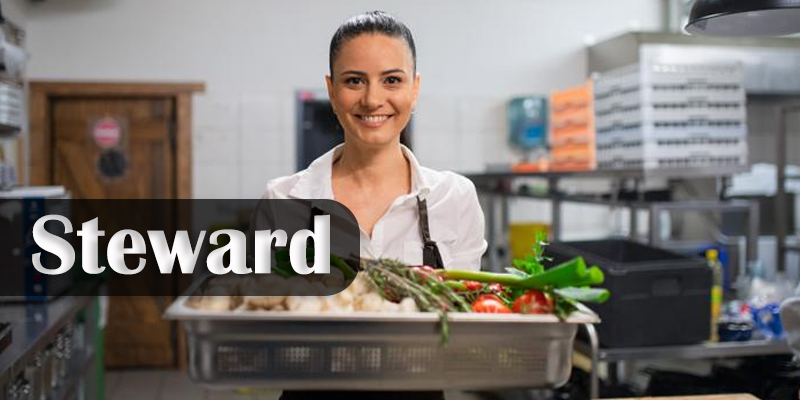iti
17 April 2025

ITI Steward Syllabus (English)
Course Overview
- Trade Name: Steward
- Duration: 1 Year (2 Semesters)
- NSQF Level: Level 4
- Eligibility: 10th Grade Pass with English as a subject
- Objective: To train candidates in professional food and beverage service, including guest handling, table setup, and hygiene, preparing them for roles as stewards, waiters, or service staff in hotels, restaurants, cruise ships, or self-employment in catering/event services.
- Certification: National Trade Certificate (NTC) by NCVT
Detailed Syllabus
Semester 1
Trade Theory
- Introduction to Hospitality: Role of a steward, importance of food and beverage service, hospitality industry overview.
- Safety and Hygiene: Personal hygiene, kitchen sanitation, fire safety, handling glassware/cutlery safely.
- Restaurant Equipment: Types of cutlery, crockery, glassware, trays; their uses and maintenance.
- Table Setup: Laying tablecloths, napkin folding, setting covers for breakfast/lunch/dinner.
- Menu Knowledge: Types of menus (à la carte, table d’hôte), basic food and beverage terminology.
- Service Etiquette: Greeting guests, taking orders, presenting menus, sequence of service.
- Basic Communication: English for guest interaction, telephone manners, teamwork in restaurants.
Trade Practical
- Hygiene Practice: Maintaining personal grooming, washing hands, wearing uniforms correctly.
- Equipment Handling: Polishing silverware, cleaning glassware, arranging trays.
- Table Setting: Laying tablecloths, folding napkins (fan, crown), setting covers for meals.
- Service Practice: Greeting guests, presenting menus, taking mock orders, serving water/tea.
- Sideboard Setup: Preparing service stations with condiments, napkins, spare cutlery.
- Cleaning Tasks: Clearing tables, changing ashtrays, resetting dining areas.
- Project Work: Set up a dining table for a 4-course meal, demonstrate guest greeting and order-taking.
Hours: Theory: 160 hours | Practical: 240 hours
Semester 2
Trade Theory
- Advanced Service Techniques: Serving wines, spirits, cigars; handling special dishes (caviar, smoked salmon).
- Banquet and Buffet Service: Organizing parties, setting up buffets, managing large groups.
- Food and Beverage Pairing: Basics of wine pairing, beverage service (tea, coffee, cocktails).
- Customer Relations: Handling complaints, building rapport, upselling techniques.
- Billing and Payment: Preparing bills, processing cash/card payments, maintaining records.
- Environmental Practices: Waste management, water conservation, eco-friendly service practices.
- Entrepreneurship: Starting a catering service, trends in hospitality (e.g., themed dining).
Trade Practical
- Beverage Service: Serving red/white wines, pouring spirits, presenting cigars.
- Banquet Setup: Arranging tables for events, decorating for banquets, serving buffet meals.
- Order Management: Writing KOT (Kitchen Order Ticket), passing orders to kitchen, serving promptly.
- Customer Handling: Resolving mock complaints, practicing upselling with menus.
- Billing Practice: Preparing manual bills, using POS systems, handling payments.
- Special Service: Serving Indian/Chinese dishes, managing room service orders.
- Project Work: Organize a mock banquet for 10 guests, including setup, service, and billing.
Hours: Theory: 160 hours | Practical: 240 hours
Additional Components
- Workshop Calculation and Science
- Calculations: Portion cost estimation, billing calculations, inventory tracking.
- Science: Food safety principles, effects of temperature on beverages, hygiene chemistry.
- Hours: 80 hours/year
- Engineering Drawing
- Drawings: Dining area layouts, buffet table plans, service flow charts.
- Hours: 80 hours/year
- Employability Skills
- Communication: Conversing with guests in English, handling queries, team coordination.
- IT Literacy: Using POS software, online booking systems, basic Excel for records.
- Soft Skills: Time management, stress handling, resume writing, interview preparation.
- Hours: 60 hours/year
Assessment and Certification
- Exams:
- Theory: Written exams per semester (MCQs, descriptive questions).
- Practical: Tasks like table setup, beverage service, guest handling, billing accuracy.
- Evaluation Criteria: Service speed, hygiene, guest interaction, setup precision.
- Certification: NCVT National Trade Certificate (NTC), globally recognized.
Career Opportunities
- Employment: Steward, waiter, or service staff in hotels, restaurants, cruise ships, or clubs.
- Self-Employment: Catering services, event management, freelance banquet staffing.
- Further Studies: Diploma in Hotel Management, certifications in barista skills or wine service.
Trade Type
- 10 views